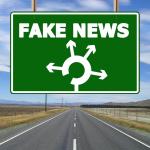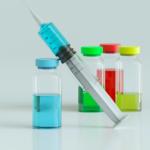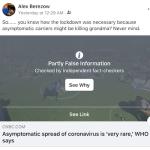No matter which side of the political aisle, there is a fear that misinformation is more powerful than truth – it spreads quickly and has brought much damage to our society.
fake news
“There is an overwhelming consensus on the evidence among scientists yet there are also vocal commentators who reject this consensus, convincing many of the public, and often the media too, that the consensus is not based
“Scientists at the University of Natural Resources and Life Sciences in Vienna found that bacteria living inside a cow’s rumen – one of the four compartments of its stomach – can digest certain plastics, including those used to make
“Cotton’s statements did not get any immediate coverage, but several days later David Choi at Business Insider wrote them up with the headline “Republican senator suggests ‘worse than Chernobyl’ coronavirus could've come from Ch
Misinformation and disinformation have emerged as two of the most important threats in the world today.
Henry I. Miller and Andrew I. Fillat
Synchronization of cells, so that they act in concert, is mediated by the chemistry and electricity, as neural impulses, in their environment.
Well, this is certainly interesting. An article from CNBC that I posted on my personal Facebook page has been flagged by Facebook fact-checkers as containing "partly false information."
Mayor Giuliani now thinks he's Dr. Giuliani. His website is offering up two very bad videos on coronavirus and COVID-19.
Which snowflake caused the avalanche? It's a ridiculous question because we all know the answer: Blame can't be placed on any particular snowflake; it was the accumulation of billions of them that caused the avalanche.












